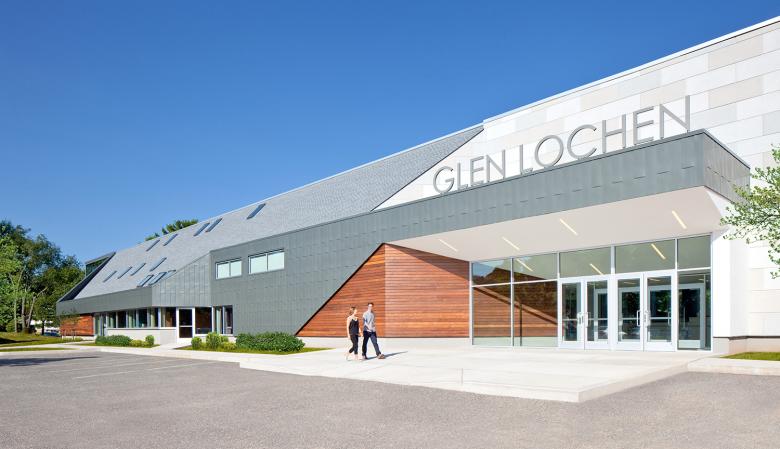Glen Lochen
"Dead malls" are an unfortunate side effect of the United States' mix of sprawl, auto dependence and short-lived retail trends. They are also opportunities for developers and architects to create new places built upon the malls' old bones. In Glastonbury, Connecticut, this meant transforming a mid-1970s mall into a mixed-use destination with offices and retail. Amenta Emma Architects answered a few questions about the building.
What were the circumstances of receiving the commission for this project?
We were referred by a real estate professional based on our reputation for creating contemporary spaces and being inventive about working within tight budgets.
Please provide an overview of the project.
Originally built in 1975, the Glen Lochen Mall was once a vibrant local institution, housing first-class restaurants, shopping and offices. Over nearly forty years, time and neglect contributed to the dilapidation of this once vibrant destination. Our firm was hired to renovate this property and create a re-invented identity for the site features, building exterior and interior common spaces. With a mixed-use commercial program, this project features ground floor retail and dining with office spaces on the second and third floors. The renovation has helped restore this local cultural landmark and has already proved successful in drawing occupants and visitors back.
What are the main ideas and inspirations influencing the design of the building?
The main goal of the project was to create a drastic, yet cost effective approach to re-conceiving the building’s public identity. As such the primary focus of the redevelopment was the building’s skin and public points of entry. We were influenced by the strong angular geometries of the existing building and sought to create a design vocabulary that would work in response to this while unifying the many disparate volumes of the facade.
Was the project influenced by any trends in energy-conservation, construction, or design?
This project was greatly influenced by the design-build project delivery model. Both architect and builder collaborated closely from the onset of design to refine the project in regards to constructability and cost. This iterative feedback between the architect and builder preserved the design integrity throughout the project while offering creative options for addressing budget constraints.
What products or materials have contributed to the success of the completed building?
The exterior material ensemble that was developed for this project was quite successful in forming a contemporary identify to the redeveloped building while integrating with the extensive palette of wood on the interior of the existing building. A selection of exterior materials -- zinc cladding, Cumaru wood rain-screen and patterned stucco -- were deployed to offer a textural variety to the facade that provided the building a more human scale.
Email interview conducted by John Hill.
Glen Lochen
2014Glastonbury, Connecticut
Client
SCT Holdings, LLC
Architect
Amenta Emma Architects
Hartford, CT
Design Principal/Project Manager
Michael Tyre, AIA
Structural Engineer
Edward Stanley Engineers
MEP/FP Engineer
Link Mechanical
Landscape Architect
Darlene Dumaine
Contractor
Tall Construction Company
Zinc Wall Cladding
Rheinzinc
Wood Rainscreen
Climate Shield
Aluminum Windows and Entrances
YKK
Building Area
66,000 square feet
Photographs
Anthony Crisafulli
Drawings
Michael Tyre






